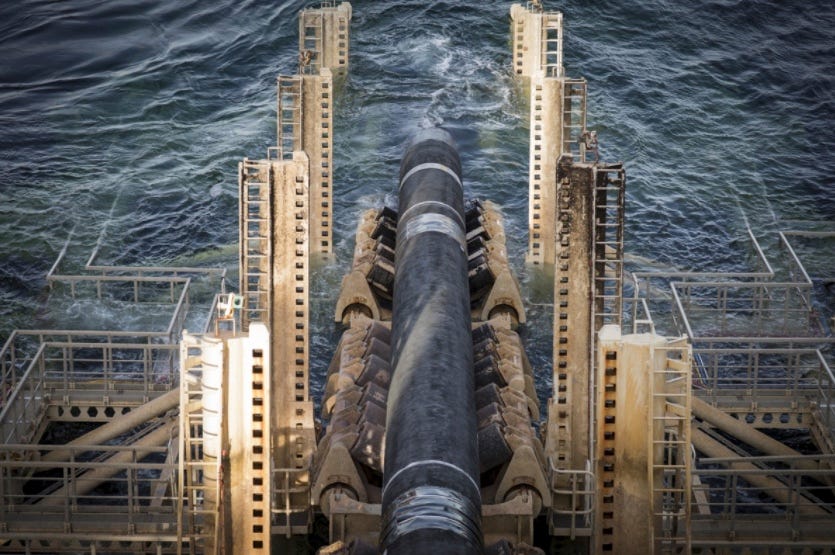Brussels punts on nuclear question, plus Glasgow spurs ESG fund buying spree
Welcome to Callaway Climate Insights, and happy holidays -- especially to our new subscribers this week.
Callaway Climate Insights publishes Tuesdays and Thursdays for everybody. To get our insights and analysis every day, please subscribe.
More than 50% of the contiguous U.S. was in a drought by the end of November, according to NOAA. The average November temperature across the contiguous U.S. was 45.2°F. (3.5 degrees above the 20th-century average), which placed the month at the seventh-warmest November in the 127-year record. The nation’s average precipitation across the contiguous U.S. was 1.28 inches, almost an inch below average.
The European Union took a big step Thursday toward setting into law categories on what investors and businesses can consider sustainable environmental practices. But it left the prickly question of where in the spectrum nuclear energy falls unanswered.
The EU Taxonomy is a hideous name for a vital set of rules that will ultimately govern sustainable economic activities with goals such as climate change mitigation and adaptation, as well as disclosure around sustainable investment products. In passing the taxonomy, the EU Council set it to take effect on Jan. 1.
But a fierce debate over whether nuclear energy, as well as some forms of natural gas, can fall under the taxonomy as part of any economic “transition,” caused the council to push those two off for further discussion. The EU is divided on nuclear energy, with some members such as France big proponents of nuclear power while Germany, among others, is against it. Earlier this week, Germany’s incoming government said it dropped plans to oppose nuclear in the blueprint, indicating a deal might be close.
It appears Brussels diplomats instead decided getting the vast majority of the taxonomy into law sooner was more important than addressing the divide. But with natural gas prices surging this month and winter energy shortages across the continent, both gas and nuclear must be decided before investors and companies can really take the law to hand.
While Europe will be keen to declare victory and go home for the holidays, come January the hard decisions will still have to be made.
More insights below. . . .
Don’t forget to contact me directly if you have suggestions or ideas at dcallaway@callawayclimateinsights.com.
ZEUS: Germany's new leader faces immediate climate crisis as carbon soars
. . . . New German Chancellor Olaf Scholz inherits a country in climate crisis this week as soaring carbon prices and the standoff over the Ukraine between Russia and the U.S. threaten the climate-friendly policies he and his coalition brought in, writes David Callaway. That’s not to mention Omicron. As carbon markets rise, Germany’s historic reliance on coal becomes a bigger problem for its government, as well as for the Nord Stream 2 gas pipeline from Russia that has caused such controversy. With Angela Merkel gone, suddenly Scholz is the man in the middle. . . .
The last time a journalist won the Nobel Peace Prize was the Nazi era. Until Friday.
. . . . On Friday, two journalists will step on stage at Stockholm City Hall to accept the Nobel Peace Prize, including my friend Maria Ressa, founder of the Philippines digital news organization Rappler. Ressa and Dmitry Muratov, editor of the Russian newspaper Novaya Gazeta, will be the first journalists to win the prize since 1935, in the Nazi era. In this special commentary, courtesy of the World Editors Forum, Mexican editor Javier Garza Ramos looks back on the conditions for journalists just before World War II compared to now, and wonders why it took so long. . . .
EU Notebook: The age of environmental passports for every product is upon us

. . . . The European Union is considering tagging every product sold on the continent with a “digital product passport,” which will act as papers for consumers to tell where the product was made and from what materials, to better decide how to recycle, writes Daniel Byrne from Dublin. The strategy would involve bringing together every component of a product’s supply chain in a sustainable fashion to lower the entire carbon footprint of the product and its company.
Plus, the new German government drops plans to oppose the use of nuclear energy in Europe’s renewable energy blueprint. . . .
Thursday’s subscriber insights: Will EVs become a two-horse race?
. . . . Elon Musk probably isn’t looking over his shoulder just yet, but recent big announcements from Ford (F) and GM (GM) about massive electric vehicles operations has some analysts wondering who will win this race in the short term. Say five years. As Big Auto floods the market, strategy may be more important than sex appeal, analysts say. Read more here. . . .
. . . . Solar farms are increasingly moving from the farm to the city, where the energy is needed more. A handful of cities are now building them at their airports, which despite some concern about glare for incoming pilots, make sense from an energy need, and a tax subsidy standpoint. But will they work? Read more here. . . .
. . . . With gasoline prices high, oil companies have been throwing their weight around, suggesting there should be more fossil fuel investment rather than less. But now fuel costs are projected to fall next year, impinging on profits. A handful of big oil companies — such as BP, which just bought another EV charging company — aren’t waiting around. Read about them here. . . .
. . . . President Joe Biden’s announcement this week that the federal government will try to go carbon neutral by 2050 left plenty of questions unanswered. Chief among them is how all the contracts will be altered on servicing some 300,000 buildings, 600,000 vehicles and $650 billion in goods and services. The key benefit, though, may be in setting an example for state and local governments. Read more here. . . .
Editor’s picks: $2 bln inflow to UK’s ESG funds; plus, insurers focus on resilience
Insurers make progress on climate resilience
The insurance industry made progress on climate change resilience at COP26, but faces big challenges to reducing or eliminating underwriting for carbon-related activities, Ben Dyson writes for S&P Global Market Intelligence. In an insight report, Dyson notes two industry initiatives focusing on greater climate resilience. The Insurance Development Forum, an industry-led public-private initiative that aims to improve countries' natural disaster resilience through insurance and risk management, at COP26 launched the Global Risk Modeling Alliance, which seeks to improve climate-vulnerable countries' access to risk modeling. It also co-established the Global Resilience Index Initiative to create a global model for measuring climate resilience.
A ‘sea of spills’ goes unreported
In one of the first comprehensive studies of images captured by the Envisat satellite, researchers with French consultancy firm VisioTerra found evidence of 18,063 oil slicks in the Gulf of Guinea between 2002 and 2012, according to Ashoka Mukpo writing in Mongabay this week. The report says that while some of the slicks were caused by natural seepages from oil-rich coastal areas, the bulk were tied to shipping and offshore oil production. Researchers told Mongabay the images suggest that the total amount of oil spilled into the Gulf of Guinea over the study period was greater than 2010’s Deepwater Horizon catastrophe, despite going largely unreported.
Latest findings: New research, studies and projects
How international trade and climate regimes can save the planet
Through the Intergovernmental Panel on Climate Change, the scientific community tells us that we are heading toward a climate catastrophe, say the authors of Green Bills for Green Earth: How the international trade and climate regimes work together to save the planet. “As a result, various countries are offering various promising and novel policy instruments to mitigate climate change and continue to grow macro-economically, as we witnessed in the Glasgow Conference of the Parties in 2021. In other words, finding ways to grow economically while at the same time protect the environment and mitigate climate change. In that spirit, this article first provides an overview of the global trade and climate regimes. It then offers an analysis of how the World Trade Organization globally and the European Union regionally might combat climate change in remarkable ways.” The article also provides an analysis of the European Green Deal and the U.S. Green New Deal, “two encouraging policy instruments to help mitigate climate change ambitiously.” Finally, the article provides an assessment of the EU’s Carbon Border Adjustment Mechanism.
More of the latest research:
How the Biden Administration Can Empower Local Climate Action
Impact of the Corporate Response to Climate Risk on Financial Leverage and Systematic Risk
Words to live by . . . .
“Blow, blow, thou winter wind. Thou art not so unkind, as man’s ingratitude.” — from As You Like It by William Shakespeare.









